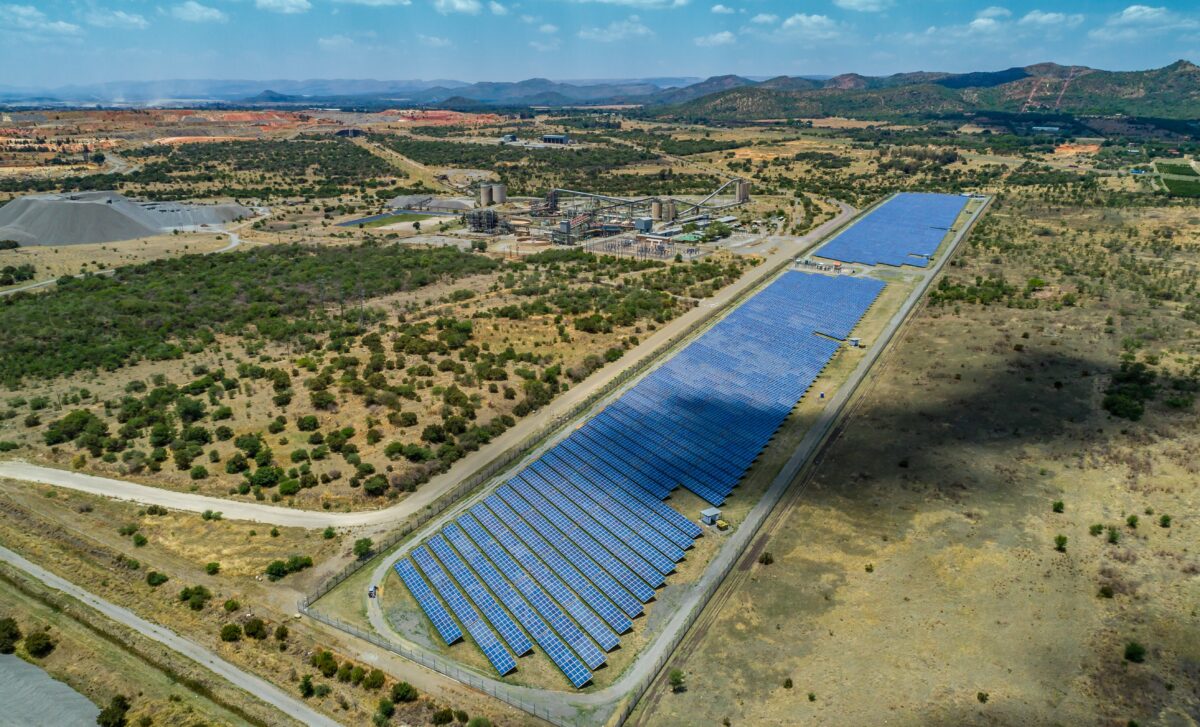As South African renewables continue to mature, the RustMo1 Solar Project, the nation's first utility scale PV site, is a testament to the transformative journey of the industry over the past decade. The 7 MW solar farm, commissioned under the Renewable Energy Independent Power Producers Procurement Programme (REIPPPP), has been operational for 10 years. The first utility scale solar plant built and operated by Juwi Renewable Energies in South Africa, RustMo provides valuable insight into the evolving landscape of South African large scale solar.
Tariff dynamics

Image: JUWI Renewable Energies
In the early rounds of the REIPPPP, high tariffs for utility scale renewables reflected the unproven nature of the program. RustMo developer Momentous Energy benefited from a tariff higher than the rate paid by national utility Eskom as the government sought to instil confidence in clean energy. Over the last decade, technological advances and cheaper debt – which reflected falling investment risk – have transformed utility scale solar from the most expensive to the cheapest clean energy source.
Simultaneously, South Africa's renewables sector saw increased competition. Developers responded by co-locating projects to optimize margins and are navigating regulatory complexity as they gain experience in the nation, and form relationships with the authorities.
Regulatory transformation
Major regulatory changes have unlocked the potential of large scale renewables. The removal of licensing caps; grid code developments that were initiated, in part, during RustMo’s development, and with the support of Juwi and Momentous; and streamlined permitting have created a more favourable environment for developers. The South African Department of Environmental Affairs, for example, stimulated the market by introducing revised regulation, making permitting for large projects at low-to-medium sensitivity sites more efficient and cost-effective.
Project sizes have ballooned since 2014, with RustMo's 7 MW generation capacity reflecting the 75 MW cap on the early bidding rounds of REIPPPP. That restriction has risen to 240 MW in bid window seven as developers target economies of scale, and has reduced the competitiveness of small REIPPPP sites.
Challenges
Aside from delayed REIPPPP bid windows, a lack of grid capacity, and high local content requirements hindering solar developers, a lesser known challenge is that negotiating agreements for projects on agricultural land has become more intricate as landowners seek optimal terms. Farmers who hold out for the best terms can render planned projects unbankable.
The arrival of engineering, procurement, and construction companies without a track record in South Africa threatens project quality and could complicate issue resolution as projects age and come online. A broader concern is the negative impact on solar of setbacks from less reputable companies. Ongoing support for utility scale solar depends on the technology maintaining a positive reputation.
Operational realities
The operation and maintenance (O&M) of solar plants is where “the rubber hits the road,” and the RustMo project has achieved a performance ratio above the guaranteed rate of 78% over the past decade. Plant availability has varied between 97% and 99.99%. This is the result of meticulous maintenance regimes, strategic planning, high standards of quality, and a robust support group of O&M contractors and owners, with Juwi’s O&M Black Economic Empowerment partner Reatile Renewables jointly owning the project with Momentous.
O&M practice at RustMo sheds light on the challenges and opportunities inherent in maintaining a solar project in South Africa over a decade.
From planning and time management to effective team collaboration, a well-informed and equipped team is critical to navigate the intricacies of large scale solar operations. Sticking to maintenance regimes and comprehensive planning – including having a facility operating plan – have been integral in ensuring seamless operation of the plant. Failure to do planned maintenance can have cascading effects, particularly for projects in remote areas where maintenance can be more challenging.
The RustMo support group – a 24-hour control room in Greece; Cape Town back-office support; and sub-contractors – are integral to O&M, particularly during periods of heightened uncertainty. The availability of essential information, guidelines, and tools enhance the team's ability to address challenges proactively.
The lessons from RustMo suggest that fostering a culture of collaboration and open communication contributes to effective problem solving and ensures the longevity of a solar project. Community relations require careful management and RustMo's experience emphasises the need for community liaison by the client to address concerns effectively. Local procurement and job creation, vital components of the renewable energy landscape, are areas where RustMo has actively engaged with local businesses.
Security is imperative for safeguarding equipment and personnel and RustMo has continuous monitoring, through 24-hour armed security teams and CCTV cameras.
Unexpected challenges, ranging from data storms to encounters with large snakes and fibre internet-loving rats, underscore the unpredictable nature of solar plant operations. The team’s ability to respond to such incidents highlights the resilience and adaptability needed, especially in remote areas.
Continuing impact
As RustMo embarks on its next decade, the project remains committed to community development, beyond regulatory requirements. Some 17% of dividends are contributed to the Momentous Foundation Community Trust, instead of the 2.5% required by the REIPPPP.
That means solar profits have supported early-childhood development education for 250 youngsters, provided meals for 700 children during the Covid pandemic, and financed safe flushing toilets to replace dangerous pit latrines.
Momentous recently signed a further O&M agreement with Juwi, ensuring RustMo's continued contribution to clean energy generation and socioeconomic development. The project is poised to generate an additional 110 GWh of clean energy, reducing carbon emissions by approximately 66,000 tons.
Beyond those direct impacts, RustMo1 serves as a model that inspired the evolution of South Africa's national renewables procurement programme. As the sector continues to evolve, RustMo is a great example of how renewable energy projects can drive environmental sustainability and meaningful social and economic impact. RustMo1 is not just a solar farm; it is a trailblazer and beacon of innovation, collaboration, and lasting positive change in South Africa's renewable energy landscape.
About the author: Richard Doyle, managing director of Juwi Renewables South Africa, is a physicist with more than a decade of global leadership, innovation, and business development experience in large scale renewable energy and independent power production. Before joining Juwi, Doyle developed some of the earliest power purchase agreements in South Africa, for independent power producers Avelar and Mulilo.
The views and opinions expressed in this article are the author’s own, and do not necessarily reflect those held by pv magazine.
This content is protected by copyright and may not be reused. If you want to cooperate with us and would like to reuse some of our content, please contact: editors@pv-magazine.com.



By submitting this form you agree to pv magazine using your data for the purposes of publishing your comment.
Your personal data will only be disclosed or otherwise transmitted to third parties for the purposes of spam filtering or if this is necessary for technical maintenance of the website. Any other transfer to third parties will not take place unless this is justified on the basis of applicable data protection regulations or if pv magazine is legally obliged to do so.
You may revoke this consent at any time with effect for the future, in which case your personal data will be deleted immediately. Otherwise, your data will be deleted if pv magazine has processed your request or the purpose of data storage is fulfilled.
Further information on data privacy can be found in our Data Protection Policy.